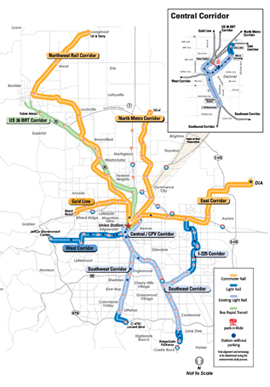Americans, David Brooks, and “The Dutch Option”
 Denver’s FasTracks transit expansion will add more than 100 miles of rail and BRT service.
Denver’s FasTracks transit expansion will add more than 100 miles of rail and BRT service.Ben Fried got it exactly right about the errors that riddled Tuesday’s David Brooks column. Brooks was so far off the mark, though, that it’s worth another look at the ways he misled readers.
The core of his argument that Americans don’t like cities rested on this survey by Pew Research Center. The survey found that Americans, when asked where they would most like to move to, named Denver, San Diego, Seattle, San Francisco, Phoenix, Portland, Sacramento, Orlando, Tampa and San Antonio as their top ten, in that order of preference. Because these cities are mostly in the west and the south, Brooks concluded that Americans are interested in living in, well, the west and the south. But then he went further, citing it as general evidence of America’s anti-urban tastes.
What Brooks didn’t address — and which I have a hard time believing he didn’t know, given his usual informedness — was that most of the 10 cities in the poll are pursuing pro-urban agendas with a vengeance. They are building lots of light rail lines. They are re-configuring streets to make them more walkable and bikeable. They are steering clear of policies and projects that would encourage more driving.
Nowhere is that more true than Denver, the number one city in the poll, which supplied the headline to Brooks’ column, "I Dream of Denver." Well, a few years ago, this object of American aspirations voted to approve what is probably the largest new mass transit system in the United States. The city of Denver and a bunch of neighboring political jurisdictions managed to come together and agree to build a half dozen light rail and commuter rail lines at once. The metro area will end up with a complete rail-based transit system in one fell swoop, without having to proceed line-by-line over decades, like most cities.
Portland, of course, has been the most aggressively pro-urban city in the country for three decades, with its mix of pro-transit, pro-biking policies all set in a state that employs some of the most cohesive growth-management practices in the country. In Portland, as readers of Streetsblog know, you can now ride a bike and have priority over cars when you come to a red light, just like in Amsterdam, the place Brooks posits as the epitome of un-American living. If Americans don’t want to be urban, why are they putting Portland in their top ten list?
Essentially all the other cities on this list are pursuing pro-urban policies, even if they aren’t all urban yet. Hell, even Tampa, in the belly of a state that defined suburban sprawl, opened a downtown streetcar line a few years ago.
Before posting this piece, I went back and re-read Brooks’ column, just to see if I had gotten everything right or missed anything. Upon review, it’s actually astonishing how misleading it is. It’s such a textbook example of selectively using facts and figures to advance faulty logic that it’s worth doing a blow-by-blow here.
First Brooks starts with an arguably true statement, that many urban planners would like Americans to live in denser, more urban places. Then he condenses that into the hyperbole that urban planners want Americans to live in Amsterdam. This is not quite the case, but it’s okay to over-simplify to make a point and to make a column easier to understand.
But then, having set up this over-simple argument, Brooks goes about arguing that the places where Americans want to live are not Amsterdam. As I think I’ve demonstrated, even going by that absurd criteria, Brooks can’t prove his point. Because Denver, Portland, and other cities on America’s top ten list are moving in the direction of "Amsterdam." Plenty of Americans do “want the Dutch option,” or an American version of it.
Every columnist must at times simply pull one out of the air, using whatever is lying around on the desk. I wonder if this was one of those times with Brooks.





